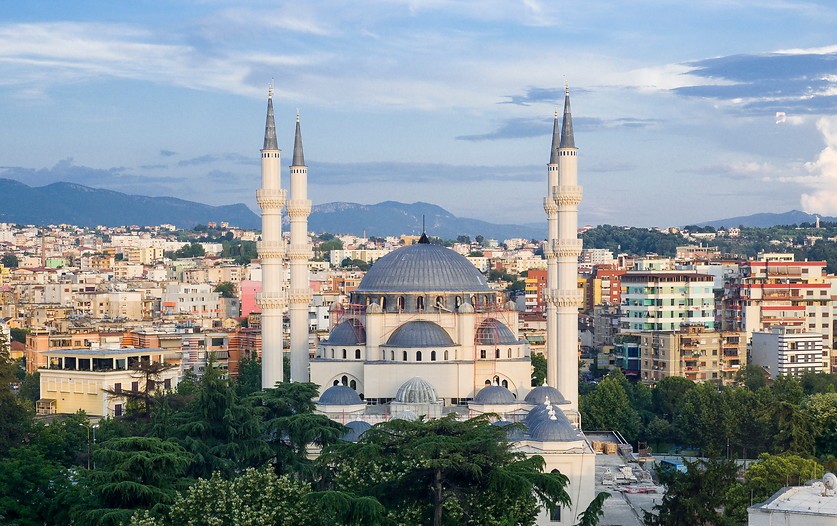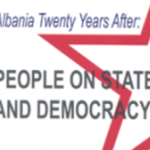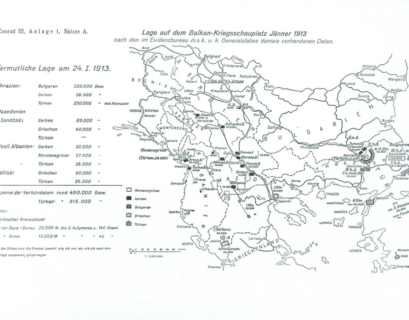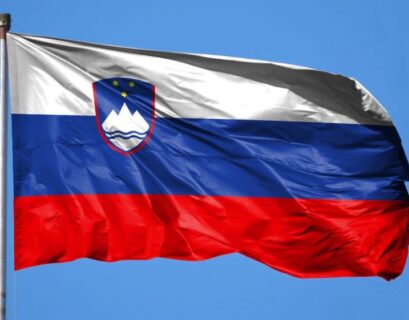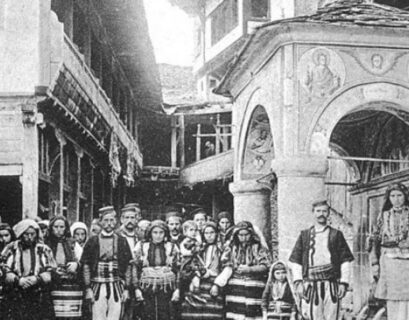By Rigels Lenja
Introduction
Countries of the western Balkans have faced during the years a long list of problems from corruption, illegal immigration, trafficking, unemployment, and building a state of rule of law. With the outbreak of war in Syria, it seems that another problem was added to the above list, the challenge from jihadists and radical Islam. Albania declared its independence in 1912, as the first country in Europe to secede from the Ottoman Empire with a majority Muslim population. In 2015, Albania ranked third or foreign fighters joining ISIS in Syria and Iraq per capita among the European countries. Only Bosnia & Herzegovina, Kosovo and Belgium had more fighter per capita joining ISIS. In cases of Bosnia and Kosovo researchers and experts put the reasons of radicalization on the outcomes of 1990s wars, due to the number of foreign fighters that appeared in the region, while some left to proceed on other parts of the world their holy war, few of them settled, however Albania in contrary did not have any war neither a complete state bankruptcy. Moreover, in Bosnia during the war foreign fighters with a Salafist and jihadist background even went on to establish a fighting unit of their own “El-Mudzahid”.
What happened? After more than 100 years as an independent state, Albania tried to reform Islam and cut every tie from the rest of the world, but became source of foreign fighters joining a terrorist organization? What are the reasons?
Since its independence, Albanian tried in any way to reduce the power of Islam either in state businesses and private life of its citizens. More or less as tentative sometimes to modernise or to convince the West that Albanian Muslims are followers of a moderate practice of Islam. In 1929, King Zog in order to reduce the power of powerful Sunni Community want further by legitimizing officially Bektashi Sufi Order as an independent religious authority without any link or dependence from Sunni Community. In the aftermath of WWII, the new communist regime reduces even further more reaching the minimum level of any religious presence in daily life of Albanian citizens, through different approaches they reached an unprecedented moment in 1967 when they declared Albanian an atheist state, prohibiting any sort of religious life and demolishing a number of religious temples.
1991-A new Chapter and A New Challenge
After the end of World War II Albania introduced the most Stalinist form of communist regime in the Central Eastern Europe. Since coming to power in 1944, the communists have made great efforts to minimize the presence of the clergy in public. This campaign culminated in 1967, when the communists simply declared religion illegal, closed almost 95% of the worshipping places, around 2300 mosques, churches, tekes, and monasteries were destroyed or reconstructed as shops or culture houses. Albania thus returned until 1990 was the only atheist country in the world, were to believe in God often resulted in long prison terms or the death penalty. In 1990, with the end of the communist regime, the return of religion was allowed. Religious communities begin to rebuild damaged monuments, building new ones and prepare and training the new clergy. As the Orthodox Church turned its eyes towards the Greek sister Church or the Patriarchate of Istanbul, Catholics were supported by the Vatican. Albanian Muslims headed towards Middle Eastern countries. Although Albanian Islam is close to the Turkish model, also due to the fact that Albania was once part of the Ottoman Empire, which would have been more logical a rapprochement with Turkey.
But until the current President Erdogan came to power, Turkey maintained a distance from religious issues, as part of the Ataturk long tradition of the 1920s and 1930s. Until 2003, Middle Eastern country’s foundations and associations had to some extent a monopoly on the construction of mosques, charitable activities, or granting of scholarships for young Muslim believers. One of the most classic forms of growth of the influences of Islam of Arab nature is the sending students for studies in the religious schools of Saudi Arabia which practices Wahhabism, a form unknown to the inhabitants of Albania and the Balkans in general. Recently, Peace Tv, a media channel founded by a Indian Muslim Salafi follower had been broadcasting programs, often inviting preachers and Imams, among them Genc Plumbi a former student from Al-Imam Muhammad bin Saud Islamic University a leading Saudi Arabia religious higher education institute. This increased the presence of associations funded by the Gulf countries but with a religious nature caused new forms of practicing Islam as Salafism, Takfirism, and Wahhabism to infiltrate Albania and then intertwined it with elements of jihadism. While a number of foundations were closed by the Albanian state after the September 11 attacks, the emergence of social media seems to have played an even greater role in the radicalisation of certain parts of the population.
Endorsing Salafism
Salafism is a predominant branch of Islam in the Middle East in particular promoted by Saudi Arabia. Through tremendous amounts of monetary sources from selling oil and gas, Saudi Arabia has promoted this version of Islam among every corner where Muslims exist. Since 1990 a long list of young people studying in Saudi Arabia, Pakistan, Egypt, Syria, or Malaysia religious schools and universities where they got in contact with Salafism. After concluding their studies, they started to implement Salafism among local population. However, though debate and tension among Albanians on Islamic issues are numerous and various, three are the top ones:
1) Secular state;
2) Nations, nationalism, and the state itself.
3) Militantism that emerges in the jihadism in foreign lands especially during the Syrian conflict years.
While the first two are very rarely preached publicly or are only discuss in a closed environment with a small audience. In general Salafist followers do not accept a secular state based on their dogma is un-Islamic, and everyone who follows the state law is an apostate. Their divide the world into two camps: Dar al-Islam and Dar al- Harb. Even though this division of the world is more part of historical study to the earliest days of Islam in the VII and VIII centuries, and does not find any place anymore in modern days. The only state they recognize is an Islamic state entirely based on the course of law and regulation of the earliest form of Islam that of Prophet Mohammed and the first four rightly guided caliphs. When it comes to nation and the existence of the state they see both concepts as against Islam and harmful to Muslims. For them the nation has not any meaning or sense, the world is only shared among Muslims and non-Muslims while the state is in their eyes another evil form that they not only do not recognize but pledge to fight until the end.
The Influence of Islamic countries
One of the successful penetrations to introduce a radical and unfamiliar Islam was through the work of charitable foundations. Although neither the Albanian state nor other independent institutions have ever made transparency on the role of NGO on radicalisation and extremism among the population. Some of the earliest NGOs with an Islamic background started operating since the end of the communist regime in the early 1990s and in particular after the 11 September attacks some of them were later linked of supporting Islamic radicalism or terrorism were: Islamic Relief Organization, Al-Haramain Foundation, Taibah International, Revival of Islamic malic society and Global Relief Fund. Even though except from the Al Haramain foundation, Albanian authorities had never published any audit of other NGO-s activities. Their office was closed by General Prosecutor Office in 2005 on charges of having links with Egyptian Islamic Jihad and AQ mostly based on information shared by US intelligence services institutions. In 1997 US State Department reported that more than 95 Islamic foundations were operating in Albania. One of the first foundations closer to Al Qaida with offices in Tirana, Al Haramani and its director Abdul Latif Saleh were expelled from Albania in 1999 on suspicion of planning to attack the US Embassy in Tirana. Mr. Saleh’s properties were later confiscated from the UN Security Council for supporting Al Qaeda (AQ), a decision that was overturned in 2011. The focus of this foundation seems to have been on the suburbs and periphery often using economic aid programs, scholarships, or the construction of mosques and other places of worship to penetrate. One of the elements that proved that many foundations and organizations were influencing on changing elements of local Islam tradition were displayed at keeping a long beard by men, the wearing of short pants, or the use of the burqa and headscarf by women. These were innovations because not only during the years of communism but also during the period between the two world wars, the state had pursued a policy that women should not use the headscarf or burqa or what they called then modernising the Albanian society with modern western values. Featuring a long beard by men during the communist years was an act that was punished with years in prison.
In the aftermath of 11/09, Albania state authorities sacked several offices of this organization. This approach was undertaken following US reports or requests. BBC reported that some well-known name launch their terrorist career by visiting Balkan, in case of Bosnia were Khalid Al-Hajj (later the head of AQ in Saudi Arabia, Nawaf al Hazmi and Khalid al-Mihdar, two of the hijackers of the 11 September attacks, Ramzi bin al-Shid, that murdered American journalist Daniel Pearl, Khalid Sheikh Mohammed who pitch the 9/11 idea personally to Bin Laden).
Further south, in Albania even so prominent VIP terrorist name, did not appear, seems to have operated, they seem to have founded organizations with ties to Egyptian Islamic Jihad or Algerian Islamic Front. During 1992-2000 they were able to found a branch of Egyptian Islamic Jihad in Tirana. Probably the most notorious name among operates on Albanian soil is Muhammed al-Zawahiri, the brother of the current AQ lead Ayman Al-Zawahiri, he was convinced as part of the so-called Returnees from Albania trial for participation in President Sadat assassination in 1981. He was reported on being active in Albania and Bosnia during 1992-2000, even though this report comes from those who were detained during the so-called Returnees from Albania trial with persons as El-Sayed Abdel-Maqsud, Ahmad Isma’il ‘Uthman, Muhammad Hassan Mahmud Tita, Ahmed Ibrahim al-Sayyid al-Naggar and Shawqi Salama Mustafa Atiya. The operation concluded with arrestment and later extradition of the aforementioned was one of the earliest arrests conducted by the CIA prior to the 2001 War on Terror declaration. Although for the so-called Tirana cell, most of the information on how this cell operated comes from al-Naggar itself. They were accused of links to terrorist organizations, for plotting to attack the Egyptian busiest market of Khan al-Khalili in 1994 and for the assassination of Egyptian Speaker of Parliament in 1990. Al Naggar’s arrestment and his subsequent execution in Egypt were criticized by Amnesty International as an unfair trial conducted in the absence of the suspect. Turkey has also played an important role in the establishment of many religious and cultural institutions of an Islamic nature. Although until 2005 Ankara did not seem to use Islam as soft power diplomacy, with the coming to power of current President Erdogan many elements in foreign policy changed. Turkey launched a campaign known as neo-ottomanism proposed by Ahmet Davutoğlu the architect of the Turkish foreign current policy line. The Balkans in this regard was an important part of Turkey to revive its influence in the territories of the former Ottoman Empire. Albania with a majority population of a moderate Islamic faith, and part of one of the regions that had the highest integration in the Ottoman Empire has seen during the last decade’s colossal investments by various Turkish state institutions. In addition to establishing higher education institutions and a large number of schools, the Turkish Cooperation and Coordination Agency (TIKA) built many religious monuments. Among them is the renovation of the oldest mosques in Tirana, Ethem Bey Mosque or the historic neighborhood of Berat, or the mosque in Preza castle. In 2015, the Turkish President himself would inaugurate the Namazgja Mosque in Tirana, an investment of $ 34 million with an area of 20,000 m2 enough to accommodate 4500 believers. Although Turkey features a much more moderate Islam than that of the Arab countries or Southeast Asia and Central Asia, since the Muslim community’s dependence on Istanbul in the 1920s and 1930s many elements are no longer common.
The influence of the Syrian conflict
The Syrian conflict started in 2011 and reached a boiling point in 2015 when more than half of Syria and Iraq were put under the control of a terrorist organization known as ISIS. The threat of ISIS was way more dangerous than any other Islamic terrorist organization has ever possessed. Al-Baghdadi’s declaration of a caliphate in 2015 in Mosul and was immediately followed by ruthless recruitment of foreign fighters among them, considerable fighters from Albanians. Albania was ranked as number 4 out of the list of countries sending jihadist fighters in Syria and Iraq with 32 fighters per 1 million inhabitants. At the top of the list was Kosovo followed by Bosnia and Belgium. In September 2014, then Foreign Minister Ditmir Bushati, publicly confirm that in Albania training camps exist for persons willing to join terrorist organizations operating in Iraq or Syria. While most of those fighters from West European countries were descendants of immigrant families, seen by many as not being integrated into their society, the case of Kosovo, Bosnia and Albania were different. All those who left to join ranks with ISIS were locals. This was a shred of evidence that jihadism had gained a place among the local population in the West Balkan by using two methods of recruitment: firstly through the internet or different social media and secondly, through NGOs and radical preachers supported by different wealthy Middle East generous donors.
Implications and Motivation of Albanians to join ISIS
Albania did never experience a large scale conflict as Bosnia or Kosovo did. In particular, Bosnia saw a large number of foreign fighters coming in order to conduct jihad in 1993. What are the reasons that pushed Albanians joining a foreign war or asking for a radical form of interpretation of Islam unfamiliar with local customs? Authority presence and inspection are probably the top reasons. Albania suffered from endemic corruption leaving a large part of society disappointed from the outcome of democracy. Followed by the lack of success toward economic and social reform, a huge part of society was unemployed, leaving a fertile ground for radicalism and extremism. Several foundations began operating out of state control or Muslim Community. This organisation’s presence was especially in the periphery where the state had little presence, and the NGOs turned up later to become the only reliable authority for the local population. They did not only support the local population, but they also built schools, health care centers, and mosques. Recently the number of mosques mushroomed, only in the area of Bovill, north-east of Tirana more than 20 mosques seem to have been built in an area where no more than 3000 residents live. Islamic Community had continued to promote a peaceful co-existence between faiths and believers, keeping a distance from being involved in governing issues and maintaining a good relationship with other three communities (Bektashi, Christian Catholic, and Orthodox catholic) however their weakness consist of not being able to control all the preaching houses and often it is even challenged by preachers who seems to be out of their control.
In 2015 KMSH report that around 200 mosque out of 725 were out of her control, representing around 30% of the worship places. KMSH is the only institution recognized as legal and spiritual representative of Sunni Muslims in the country. Financial and economic sources of some foreign foundations are incomparable to the sources of KMSH. Reasons for recruiting such a high number of citizens vary. One of the main reasons is the lack of state in some remote areas in the periphery, intertwined with poverty oftentimes extreme levels. The gap was filled by third actors, sometimes radical preachers. Although a special case was that of the 4 soldiers of the Zall Herri base in Tirana, two of them would lose their lives in the fighting in Syria. This was a case that for many experts mercenarism was why these soldiers joined with ISIS. However, one of the main reasons for recruitment is indoctrination through brainwashing. Until 2005, brainwashing was done mostly through the influence in mosques or by radical preachers, even though in the last 7 years, the emergence of ISIS brainwashing goal was amplified by social networks. It seems that in the case of foundations or preachers it is easy for state authorities to act and close their offices and arrest a number of suspects. The opposite is the case with social networks, which to some extent can be counted a global problem.
Diaspora collaboration
Since the end of the communist regime more than 500.000 Albanian immigrated to Western Europe in particular Italy, Germany, Austria, and Belgium. During the year their income had been an outstanding support for their families and government. Furthermore, recently diaspora had moved on exporting something else, a radical form of Islam. In 2017 Italian state arrested several indications who were involved in recruiting Albanian to fight in the Syrian war. The list of fighters from Albania, Kosovo and North Macedonia has been much more concerning due to the fact that several of them were promoted at the highest rank of ISIS. For instance, Lavderim Muhaxheri was chosen as the head of the Albanian jihadist brigade part of ISIS, thus having a direct report with Al Baghdadi. Another name is Abdul Jashari the head of the special force of Xhemati Alban part of the Al-Nusra front and later rank as one of the leaders of Hayat Tahrir al-Sham. It seems that the fact that they speak the same language and grow up in a similar environment has often led to collaboration between the radical elements and the Albanian origin.
Conclusion
This article focuses on the Political Islam that has been introduced in Albania during the last 20 years. Since its independence in 1912, the founding fathers of the Albanian modern state pushed an agenda to clearly promote a non-Arabic Islam by introducing local tradition and emphasizing the national identity of being Albanian over any religious background. An important role in reshaping Islam in Albania has played the latter’s relations with Turkey, Arab countries, and a number of associations and charities who arrived in Albania with an agenda to promote foreign non-local Islam interpretations in particular Takfirism, Salafist or Jihadism. Albania, a country that for a period of 45 years had one of the hardest forms of communist atheism, was seen in the 1990s as a golden opportunity for many Islamic majority countries and Islamic associations to spread their version of Islam, which often is at odds with the local or even Ottoman tradition the one which Albanian and Balkan Islam belong.
The article focuses on the role that political Islam is having in Albania. This study focuses on the penetration of the elements of a radical Islamic, through offering scholarships for studying abroad, the construction of a large number of mosques, donations, or helping to reappear social problems. Albanians topped the list of nationals that joined ISIS per capita and the third in Europe, proving a major role of a dogma which is preached among Albanian Muslims, although it does not find support from Albanian Islamic Community officials, they have created a parallel “state” of Islam by simply using funds from the third parties.
References
Amnesty International, Egypt: Further Information Death Penalty/Unfair trial/Risk of imminent execution: Ahmed Ibrahim al Sayyid al-Naggar, February 29, 2000. https://www.amnesty.org/en/documents/mde12/005/2000/en/
BBC, Bosnia: Cradle of modern jihadism, 4 July 2015, https://www.youtube.com/watch?v=M6QIopgwuIU
Demiraj, Dritan. Al Qaeda ne Europe, Michigan: Botimet M&B, 2020
Elbasani, Arolda & Roy, Olivier. “Islam in the post-Communist Balkans: alternative pathways to God” in Southeast European and Black Sea Studies, Vol. 15, No. 4, 2015.
Elsie Robert. The Albanian Bektashi, History and Culture of Albanian Bektashi, London: I.B. Tauris, 2019.
Feilcke, Adelheid. Is Kosovo a breeding ground for Islamist, Deutsche Welle , 23 December 2016. https://www.dw.com/en/is-kosovo-a-breeding-ground-for-islamists/a-36898392
Human Right Watch May 2005 Vol. 17, No. 5 (E) https://www.hrw.org/reports/2005/egypt0505/5.htm#_Toc102563435
Makalesi, Araştırma. Gulf Region and Western Balkans: A Current History of Interregional Relations, Dokuz Eylül Üniversitesi, No 3, 2017.
Mejdini Fatjona, Uncontrolled Mosques Proliferate in Albania, Balkan Insight, 17 December 2015 https://balkaninsight.com/2015/12/17/state-slams-albanian-muslim-over-uncontrolled-mosques-12-17-2015/
Radowski, Mateusz. “Islamic Extremism as a real threat to security in Europe Usage of Social conditions in the Balkan countries for the effective terrorism expansion” in Terrorism in the Balkans in the 20th and 21th Century, Warszawska: 2018.
Rakipi, Albert. Lindja e nje ndikimi radikal fetare ne Shqiperi, March 2015, Gazeta Mapo. https://gazetamapo.al/lindja-e-nje-ndikimi-te-ri-radikal-fetar-ne-shqiperi/
Reporter.al, Zanafilla e Islamit Radikal ne Shqiperi, 21 Decmber 2014, https://www.reporter.al/zanafilla-e-islamit-radikal-ne-shqiperi/
Seufert, Günter. The Changing nature of the Turkish State Authority for Religious Affairs (ARA) and Turkish Islam in Europe in Center for Applied Turkish Studies, Stiftung fur Wissenschaft und Europa No.2, June 2020.
Shtuni, Adrian. Breaking Down the Ethic Albanian Foreign Fighters Phenomenon in Soundings: an Interdisciplinary Journal, Penn State University Press: Vol. 98, No. 4, 2015.
Sot.al, Raporti, ja si u bllokuan në Shqipëri pasuritë e fondacionit pas të cilit fshihej Bin Laden, 6 August 2015 https://sot.com.al/politike/raporti-ja-si-u-bllokuan-n%C3%AB-shqip%C3%ABri-pasurit%C3%AB-e-fondacionit-pas-t%C3%AB-cilit-fshihej-bin-laden,
Statista Chart, 18 November 2015, Estimated number of fighters per capita in 2015, https://www.statista.com/chart/4024/belgium-is-the-eu-capital-for-foreign-fighters/
Steinberg, Guido. Die Takfiristen, Eine salafistisch-jihadistische Teilströmung gewinnt an Bedeutung“, Stiftung fur Wisenschaft und Politik, 9 January 2021.
Stojarová, Věra & Stojar, Richard “Balkan Regional Development: Moderate or Radical Islam for the Balkans” in Journal of Balkan and Near Eastern Studies, 2019, Vol. 21, No. 4.
Tema, Kater Komandot e Zall Herrit shkuan per te luftuar ne Siri, 21 March 2014. https://www.gazetatema.net/2014/03/21/kater-komando-te-zall-herrit-shkuan-per-te-luftuar-ne-siri-dy-u-vrane/
Turkish Cooperation and Coordination Agency (TIKA) https://www.tika.gov.tr/en/gallery/inauguration_ceremony_of_preze_castle_mosque_by_president_h_e_recep_tayyip_erdogan_in_albania_%2813_may_2015%29-28109
UN Security Council Press Release, 22 August 2011 https://www.un.org/press/en/2011/sc10365.doc.htm
US Department of Treasury, Press Release, https://www.treasury.gov/resource-center/terrorist-illicit-finance/Pages/protecting-charities_execorder_13224-a.aspx Varagur, Krithika. Albania Gets Religious, Politico.EU 15 October 2019 https://www.politico.eu/article/albania-religion-islam-mosque-muslim-catholicism-church-secular-state/
Rigels Lenja, is a Ph.D. candidate at the School of South And South East historical studies at the University of Ludwig Maximilian Munich, Germany and member of Graduate School for East and South East European Studies


